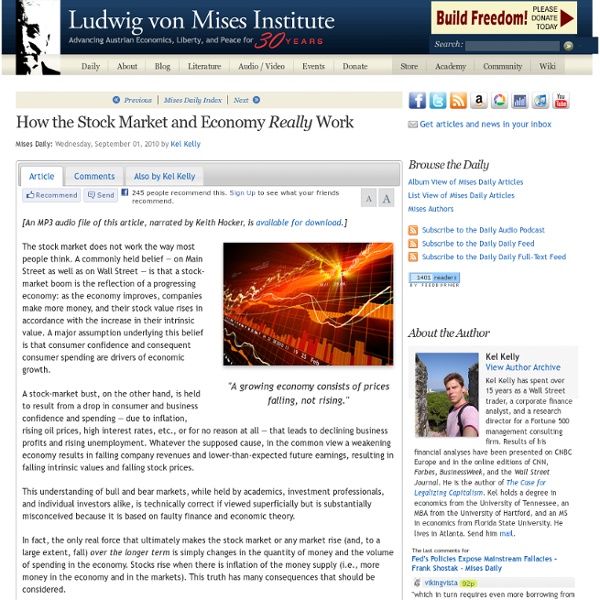The Case Against the Fed - Murray N. Rothbard
Money and Politics By far the most secret and least accountable operation of the federal government is not, as one might expect, the CIA, DIA, or some other super-secret intelligence agency. The CIA and other intelligence operations are under control of the Congress.
Simple animation to explain complex principles - Electronics - StumbleUpon
1, aircraft radial engine 2, oval Regulation 3, sewing machines 4, Malta Cross movement - second hand movement used to control the clock 5, auto change file mechanism 6, auto constant velocity universal joint
Wealth of Nations
Introduction Chapter 1. Of the Division of Stock Chapter 2. Of Money considered as a particular branch of the general Society, or of the Expense of maintaining the National Capital
What Baby Boomers’ Retirement Means For the U.S. Economy
For decades, the retirement of the baby boom generation has been a looming economic threat. Now, it’s no longer looming — it’s here. Every month, more than a quarter-million Americans turn 65. That’s a trend with profound economic consequences. Simply put, retirees don’t contribute as much to the economy as workers do.
100 Incredible Lectures from the World's Top Scientists
Posted on Thursday June 18, 2009 by Staff Writers By Sarah Russel Unless you’re enrolled at one of the best online colleges or are an elite member of the science and engineering inner circle, you’re probably left out of most of the exciting research explored by the world’s greatest scientists. But thanks to the Internet and the generosity of many universities and online colleges, you’ve now got access to the cutting edge theories and projects that are changing the world in this list below. If you’re looking for even more amazing lectures, check out our updated list for 2012 with more talks from great minds. General
A Culture of Fear - Jonathan M. Finegold Catalan
Upon the collapse of the Soviet Union, Soviet foreign spokesman Gennadi Gerasimov warned the United States, "We have done the most terrible thing to you that we could possibly have done. We have deprived you of an enemy." For nearly half a century, the elusive threat posed by the Soviet Union formed the basis of American foreign and domestic policy. Much of the United States' political and economic development was in fact a product of the government's exploitation of a supposed Soviet menace. Gerasimov recognized that the fall of communist Russia denied the American government the ability to exploit the fear of Marxism to its own benefit. It was as if the American government had lost its reason for being.
Maslow Self Actualization - unlearn. - StumbleUpon
"Self Actualization is the intrinsic growth of what is already in the organism, or more accurately, of what the organism is." Abraham Maslow Maslow studied healthy people, most psychologists study sick people. The characteristics listed here are the results of 20 years of study of people who had the "full use and exploitation of talents, capacities, potentialities, etc.."
Gold & Inflation
As the story goes, someone asked an economist how his wife was doing, and the economist answered "compared to what?" Joking aside, this is one of the most important questions one can ask when dealing with many economic problems. In recent times, with gold reaching all-time highs, we have seen people question the valuation of assets in dollars. Basically, the yardstick used to measure your assets — your house, car, or stock portfolio — is a steadily shrinking one. This makes you wonder whether your savings are really growing in value.



